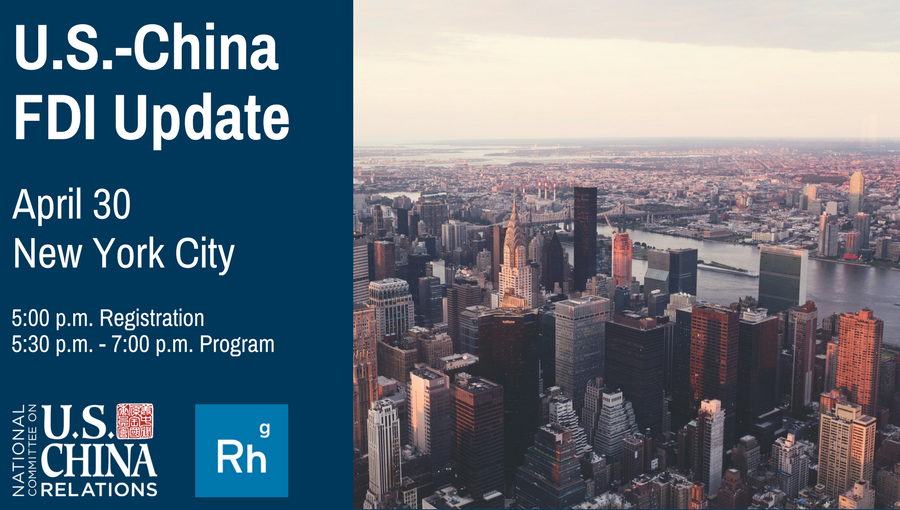Monday, April 30, 2018 | 5:00 PM EDT - 7:00 PM EDT
Dorsey & Whitney LLP |, New York, NY
After reaching a record $60 billion in 2016, foreign direct investment (FDI) flows between the United States and China have been squeezed into a diminished position by forces on both sides of the Pacific. In 2017, Chinese FDI in the United States dropped by more than one-third as Beijing re-imposed capital controls and Washington toughened screening of high-technology acquisitions; the value of newly announced transactions dropped by more than 90%. The outlook for 2018 is more uncertain still. President Trump has designated China a strategic competitor, a label not applied since 2000, and Washington is contemplating a disruptive array of more restrictive China policies to respond to national security concerns and the perceived lack of reciprocity, including greatly intensifying the investment screening process.
On April 30, the National Committee on U.S.-China Relations and Rhodium Group hosted an event in New York City, to release two studies and shape the public debate on these urgent topics: Two-Way Street, the definitive analysis of U.S.-China FDI trends from 1990 through 2017; and New Neighbors, the seminal analysis of local impacts from Chinese FDI across every U.S. congressional district. With 12 months of brand new data and a number of recent policy developments in both countries, report author Daniel Rosen provided a thorough and timely presentation of research on U.S.-China FDI, followed by a panel discussion with American legal and business leaders.
This event is part of the U.S.-China FDI Project, a multi-year research initiative that aims to provide greater transparency on FDI flows between the United States and China.

Nelson G. Dong
Nelson G. Dong heads the National Security Law Group and is co-head of the Asia group of Dorsey & Whitney, an international law firm with offices in New York City, Beijing, Shanghai, Hong Kong, and other cities. He regularly advises technology companies, professional societies, universities, and research and scientific organizations on export control, economic sanctions and national security matters, including national security reviews by the Committee on Foreign Investment in the United States (CFIUS). He is a widely recognized author and teacher on international technology law issues and has served as an adjunct professor of international law at the Seattle University Law School. He has also been an export control policy advisor to the U.S. Department of Commerce under two Presidents. Nelson was a White House Fellow and U.S. Department of Justice official in the Carter Administration with responsibility for international and national security matters. He is a director of the National Committee on U.S.-China Relations in New York City and the Washington State China Relations Council in Seattle, and he is also an active member of the Council on Foreign Relations, the World Affairs Council, and the Committee of 100. Nelson is a graduate of Stanford University and the Yale Law School and has served as a trustee of Stanford University.

Constance L. Hunter
Constance L. Hunter serves as the chief economist for KPMG LLP. She has extensive experience analyzing how economic developments and inflection points affect asset prices and businesses. Constance specializes in identifying linkages between developed and emerging markets and paradigm shifts brought about by disruptive technologies and mega trends. As an economic thought leader, she works alongside KPMG’s leadership team driving two main areas of focus: forecasting, planning, and strategy and relationship development and branding. She is also a frequent guest and co-host on major financial media channels, including CNBC, Bloomberg, and Fox Business, and is widely quoted in print media.

Stephen A. Orlins
Stephen A. Orlins has been president of the National Committee since 2005. Prior to that, he was the managing director of Carlyle Asia and the chairman of the board of Taiwan Broadband Communications, one of Taiwan’s largest cable television and high speed internet providers. Prior to joining Carlyle, Mr. Orlins was a senior advisor to AEA Investors Inc., a New York based leveraged buyout firm, with responsibility for AEA’s business activities throughout Asia. From 1983 to 1991, Mr. Orlins was with the investment banking firm of Lehman Brothers where he was a managing director from 1985 to 1991. From 1987 to 1990, he served as president of Lehman Brothers Asia. From 1976 to 1979, Mr. Orlins served in the Office of the Legal Advisor of the United States Department of State, first in the Office of the Assistant Legal Advisor for Political-Military Affairs and then for East Asian and Pacific Affairs. While in that office, he was a member of the legal team that helped establish diplomatic relations with the People’s Republic of China. Mr. Orlins is a magna cum laude graduate of Harvard College and earned his law degree at Harvard Law School. He speaks Mandarin Chinese and is a member of the Council on Foreign Relations.

Daniel H. Rosen
Report author Daniel H. Rosen is a founding partner of Rhodium Group and leads the firm’s work on China. Mr. Rosen has more than two decades of experience analyzing China’s economy, corporate sector and U.S.-China economic and commercial relations. He is affiliated with a number of American think tanks focused on international economics, and is an adjunct associate professor at Columbia University. From 2000–2001, Mr. Rosen was senior adviser for international economic policy at the White House National Economic Council and National Security Council. He is a member of the Council on Foreign Relations, and board member of the National Committee on U.S.-China Relations.
